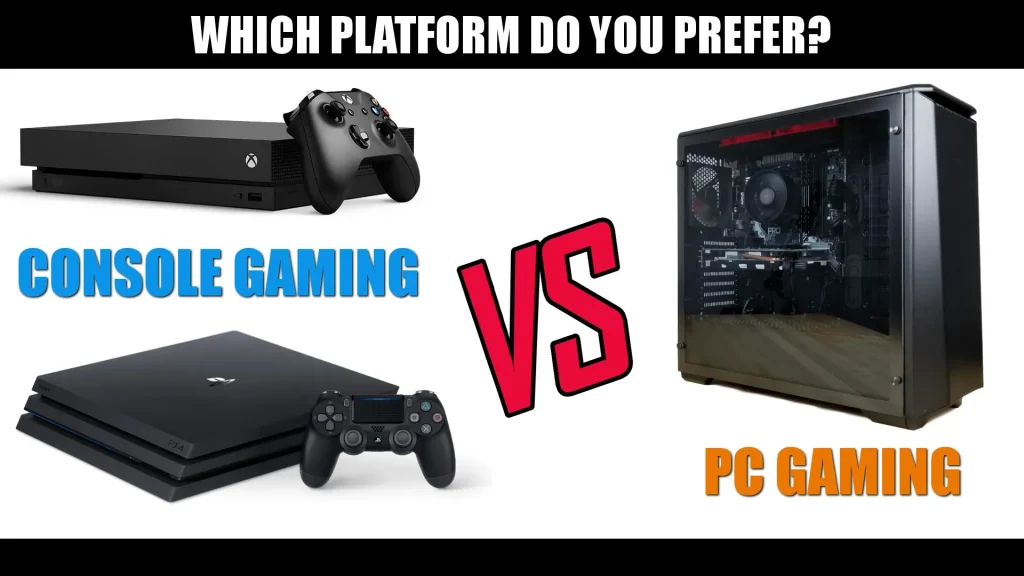Console vs PC gaming shapes how players plan budgets, playstyles, and expectations for performance. On one side, consoles promise a simple, couch-friendly setup and a smooth plug-and-play experience. On the other, PC systems offer customization, higher frame-rate potential, and broader hardware choices. This introductory comparison highlights the core trade-offs between convenience, image quality, and total cost of ownership. Understanding these dynamics helps you decide which path best fits your lifestyle and gaming priorities.
From a semantic perspective, the console ecosystem emphasizes ease of use and integrated services, while the PC ecosystem centers on configurability and upgradability. PC gaming advantages include higher frame rates, more precise input options, and the freedom to tailor hardware and software to the games you love. Conversely, console gaming pros and cons center on a predictable couch-friendly experience, strong first-party exclusives, and a straightforward maintenance path. When weighing framerate and latency in gaming, consider how upgrade cycles and digital libraries impact your overall value and how a blended setup might suit your space, budget, and goals.
Console vs PC Gaming: Performance, Framerate, and Upgradability
When weighing Console vs PC Gaming, the PC generally delivers greater raw performance potential. A capable PC can push higher frame rates and resolutions, with 4K gaming at high refresh rates when paired with a strong GPU, fast CPU, and ample RAM. This translates into a smoother experience for enthusiasts who chase peak visuals and the tightest timing, underscoring the PC gaming advantages in framerate and latency in gaming. The flexibility to tune settings, enable technologies like variable refresh rate (VRR), and choose a high-refresh-rate monitor gives PC setups a tailored edge for demanding titles.
In contrast, a console offers a stable, plug-and-play experience that remains consistent across its lifecycle. Consoles prioritize ease of use and predictable performance, which means you can enjoy reliable visuals with minimal setup. However, this comes with trade-offs: limited upgradability means you’re locked to generations of hardware for several years, and you might forego some of the raw headroom that a mid- to high-end PC can provide. If you value simplicity and a straightforward path to gaming without ongoing tinkering, the console route shines in the Console gaming pros and cons sense.
Game Libraries, Exclusives, and Cost Considerations for the Long Run
A core factor in the Console vs PC Gaming debate is the availability of games through different libraries and exclusives. Console libraries often feature strong, long-standing exclusives that anchor a platform’s identity, offering a curated catalog that can be hard to match on PC. This reality feeds into the idea of game libraries and exclusives as a decisive factor for many players who prioritize certain franchises and first-party titles.
PC gaming opens the door to an expansive and continually growing library across Steam, Epic Games Store, GOG, and more. In addition to a vast catalog of titles, PC gamers benefit from frequent discounts, backward compatibility where possible, and robust access to indie gems and modded content. These advantages reinforce the idea that PC gaming advantages extend beyond raw power, touching on affordability over time, broad game access, and a thriving ecosystem for experimentation and customization.
Frequently Asked Questions
Console vs PC gaming: what are the core differences in performance, game libraries and exclusives, and total ownership costs?
PC gaming advantages include higher frame rates and resolutions with upgradable hardware, and a vast library with mods. Console vs PC gaming delivers a stable, plug‑and‑play experience and easier setup. In terms of libraries and exclusives, PC offers a broad catalog, backward compatibility, and frequent sales, while consoles host first‑party exclusives that aren’t available elsewhere. On cost, consoles usually have a lower upfront price and predictable ongoing costs, whereas PC builds vary widely and may require periodic upgrades to stay current. If you want the maximum performance and flexibility, a PC is often the better value; if you prefer simplicity and exclusive experiences you can’t miss, a console is a strong choice.
In Console vs PC gaming, how do framerate and latency in gaming influence the choice, considering console gaming pros and cons vs PC gaming advantages?
Framerate and latency in gaming are usually better on a PC when you pair it with a high‑refresh monitor and technologies like VRR, which is part of the PC gaming advantages. This makes fast, competitive titles feel more responsive. Consoles deliver a reliable, couch‑friendly experience with consistent performance and strong exclusives, a core element of console gaming pros and cons. If raw performance and customization matter most, PC gaming advantages tend to win; if you value straightforward setup and living‑room play, a console fits well. Many players adopt a blended setup—console for living‑room gaming and a PC for competitive or PC‑exclusive titles.
| Aspect | Key Points |
|---|---|
| Performance and Visuals |
|
| Libraries, Exclusives, and Game Availability |
|
| Cost of Entry and Total Ownership |
|
| Input, Comfort, and Accessibility |
|
| Upgradability, Longevity, and Future-Proofing |
|
| Online Services, Social Features, and Cross-Play |
|
| Real-world Performance and Visual Fidelity in Practice |
|
| Choosing Based on Playstyle and Priorities |
|
Summary
Console vs PC gaming presents two paths in the modern gaming landscape, each with its own strengths and trade-offs. Console gaming prioritizes simplicity, exclusive experiences, couch-friendly play, and a predictable lifecycle, while PC gaming emphasizes raw performance, an expansive game library, and hardware customization. Your best setup aligns with your budget, preferred playstyle, and how you value convenience versus customization. For newcomers, a console offers a gentle entry into gaming; for enthusiasts who crave the highest fidelity and flexibility, a PC provides more room to grow. In the end, the right choice fits your life and your gaming goals, and you can even opt for a blended approach to enjoy the best of both worlds.

